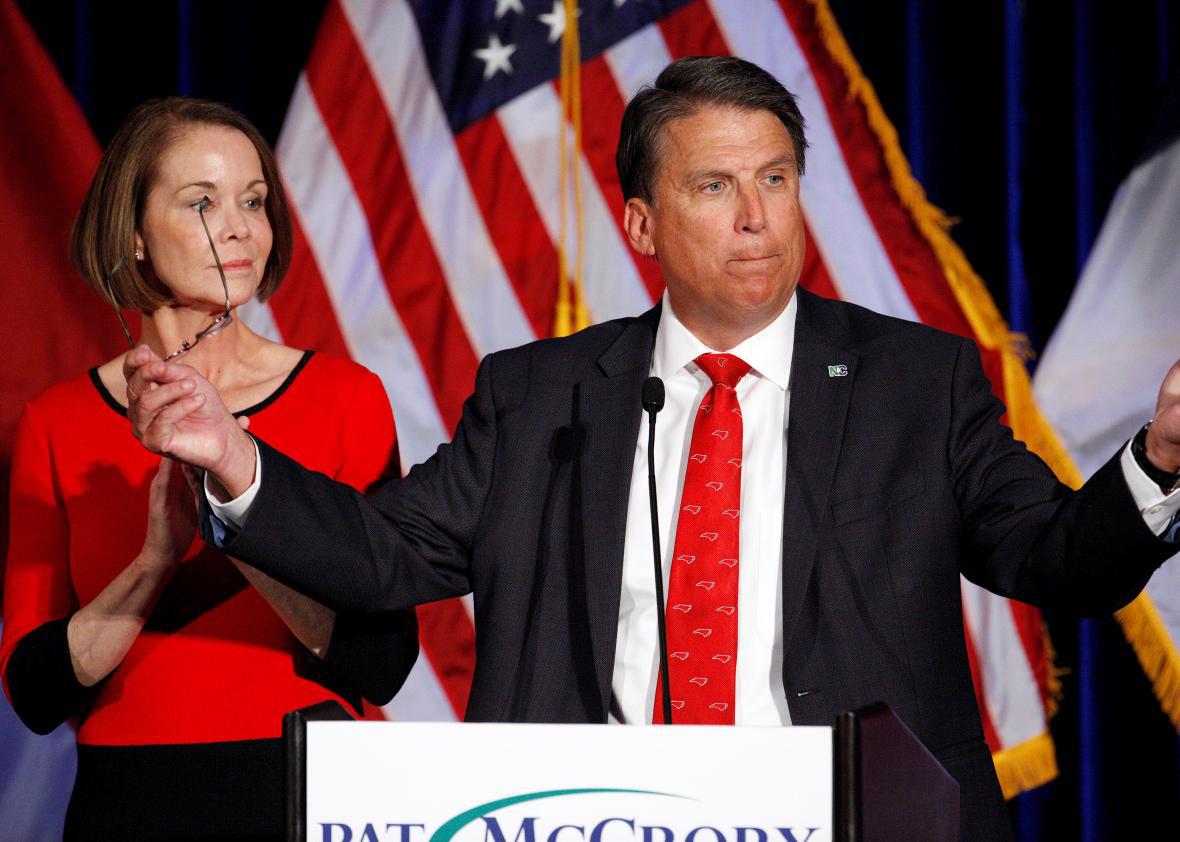North Carolina Republican Gov. Pat McCrory, champion of the country’s most notorious anti-LGBTQ law, lost his bid for re-election on Nov. 8—at last count, by 7,448 votes. Yet nearly two weeks later, McCrory still refuses to concede. Instead, he and his legal team are baselessly alleging that the results were tainted by fraud, petitioning election boards to review the results and determine their validity. McCrory is not so obtuse as to think he can actually overtake his opponent, Democratic Attorney General Roy Cooper, in raw votes. His strategy is more insidious: He seems intent on delaying the formal declaration of a winner—and delegitimizing the voting process—in order to let the Republican-dominated legislature ignore the true result and re-install McCrory as governor for another four years.
This chicanery will be easier to pull off than you might expect. Thus far, McCrory has questioned votes in more than half of North Carolina’s counties. One attorney monitoring the proceedings called these challenges “silly, small in number, poorly researched and often defamatory,” which is undeniable: Republican-controlled county election boards have forcefully rejected McCrory’s challenges, concluding that there is simply no proof of widespread fraud or malfeasance as McCrory claims. Frustrated by these setbacks, McCrory petitioned the Republican-controlled State Board of Elections to take over the review process. The board refused, but it agreed to meet on Tuesday to set guidelines for how county boards should address complaints.
Despite the utter lack of evidence to support allegations of fraud, McCrory’s team has launched a misinformation campaign to cast a pall of suspicion over the results. His campaign spokesman asked, “Why is Roy Cooper fighting to count the votes of dead people and felons?” McCrory’s close ally and current state budget director, Andrew T. Heath, also tweeted that Durham County has 231,000 residents over the age of 18 but 232,000 registered voters, implying fraud. (In reality, Durham’s 2015 voting-age population was about 235,600, and the county has only 193,659 active registered voters; its Republican-controlled election board already unanimously rejected a complaint alleging malfeasance.) Now McCrory’s lawyers are targeting black American voter outreach groups for purportedly violating minor procedural rules while helping voters fill out absentee ballots. The governor has falsely accused these groups of conducting a “massive voter fraud scheme.”
McCrory can, and probably will, still ask for a statewide recount. But he must know that a recount will not close such a sizable gap. His real goal appears to be to delegitimize the results to such an extent that the state legislature—which holds a Republican supermajority—can step in and select him as the winner. North Carolina state law states that when “a contest arises out of the general election,” and that contest pertains “to the conduct or results of the election,” the legislature “shall determine which candidate received the highest number of votes” and “declare that candidate to be elected.” By alleging fraud, mishandling of ballots, and irregular vote-counting, McCrory is laying the groundwork for the legislature to proclaim that a “contest” has arisen as to “the conduct or results of the election.” At that point, it can step in, assert that McCrory received “the highest number” of legitimate votes, and “declare [him] to be elected.”
The best part? Under the law, the legislature’s decision is “not reviewable” by the courts. Republican legislators can simply step in, overturn the decision of the voters, and grant McCrory another term. The courts have no authority even to review the legality of their actions.
While McCrory works to reverse the results of his election, the legislature is contemplating a plan to effectively negate a state Supreme Court contest. On Election Day, voters ousted a conservative justice and replaced him with a progressive, tipping the court’s balance of power toward Democrats. Republican legislators so feared this result that they attempted to bar the progressive candidate from running, passing a law that was struck down as unconstitutional. Now they are floating a plan to pack the court, expanding it from seven to nine members—and allowing McCrory to name its two new members, thereby conserving its conservative majority. The legislature passed HB2 in 12 hours. It could ram through a court-packing bill just as quickly.
This scheme, of course, would directly contravene the voters’ recent decision to move the state Supreme Court in a liberal direction. But North Carolina Republicans no longer care much about the will of the voters. Instead of accepting the results of the election, Republicans are attempting to entrench their power through a series of unethical, underhanded, and constitutionally dubious maneuvers. Their corrupt disregard for basic governing norms—their blatant preference for raw power over democratic legitimacy—should alarm us all. What’s happening in North Carolina is not mere politics. It is a perversion of democracy.
